When Islamists killed four coffee farmers, the survivors found forgiveness and healing through faith and the global body of Christ.
After packing his lunch for the day, Kila walked through Kalemago village, heading for the eastern slope of Mount Pohu. The bright morning promised good weather for the coffee harvest. Kila had at first been reluctant to work on the farm harvesting coffee and cocoa beans. It was located practically at the doorstep of a secret base of the East Indonesian Mujahideen (MIT), the first Indonesian extremist group to swear allegiance to the self-proclaimed Islamic State (ISIS).
Less than a year earlier, Kila and a friend had been abducted and held hostage by MIT militants, one of whom Kila recognised as a man called Qatar, who was notorious for beheading his victims. Upon learning that Kila was a Christian, the militants had repeatedly told him to renounce his faith and join their cause. Although Kila had been certain he would die that day, the Islamists eventually released him and his friend.
Within a week of Kila’s abduction, two other Christian farmers were abducted, and this time one of them was killed. The militants also beheaded a retired military officer — also a Christian — in an unrelated incident. Then, in November 2020, a Christian family in a neighbouring district was brutally murdered and several house churches and prayer chapels were burned.
Kila had good reason to stay near the village with his elderly father and avoid the hillside farm, but on the morning of 11 May 2021, he joined many other Kalemago farmers who were taking advantage of the nice weather to work in their fields.
On the way to his coffee farm, Kila stopped to chat with his neighbours Marten Solon and Marten’s brother-in-law, Simson Susa, who were already at work in their fields. Simson, who usually lived with the Solon family, had been staying on the farm recently because he had been sick and couldn’t hike up the hillside every day. Marten had joined Simson a few days earlier to check on him and keep him company. Like most farmers in the area, they had a small hut on their land where they could store supplies, rest and take cover from rain. The farmers often keep food and bedding in the huts so they can stay on the farms during harvest season instead of trekking back and forth.
Kila continued on his way, but shortly after passing Marten Solon’s farm, he saw something that stopped him in his tracks. Just ahead of him, five MIT militants were setting up a roadblock, and one of them was the man known as Qatar. When they waved for Kila to walk toward them, fear gripped his heart as he remembered his previous abduction. Feeling certain that he would not survive a second encounter, he dove into the brush beside the road and fled across the coffee fields toward the forest.
Kila spotted Marten in the distance and ran toward him. “Terrorists are coming!” he called. “Hurry and run!”
“I have to get Simson first,” Marten replied, heading for the hut. “Then I’ll save myself.”
Kila continued to run for more than an hour, avoiding the main road and trying to take the safest route back to the village. When he came upon another Kalemago farmer, he warned him of the terrorists, and that man ran too. “I kept praying to God in my heart to save my life,” Kila said.
When Kila arrived in Kalemago, he alerted other villagers and borrowed a friend’s motorbike. He first rode to the army security post, but no one was there. Continuing on in search of help, his concern mounted for friends and neighbours in the path of the militants. When he finally reached a police station, they contacted the military, who rushed toward Kalemago.
By then, however, the worst had already occurred.
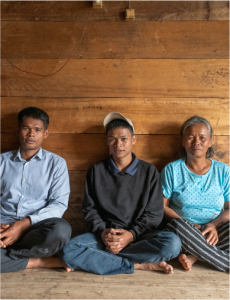 Maria Solon with her sons
Maria Solon with her sons
The Shadow of Death
Indonesia has the largest Muslim population in the world, totalling more than 220 million people, but the highlands of Central Sulawesi are home to many Christians. In Kalemago, for example, all but three of the approximately 200 families are Christian.
South Sulawesi, however, is the birthplace of a particular brand of Islamic radicalism that seeks to make Indonesia an Islamic state under Sharia (Islamic law). This radicalised ideology has spread into Central Sulawesi, creating a network of Islamic hardliners who sympathise with efforts to eradicate Christianity on the island. The Islamist network helped ensure that MIT was able to hide and survive in an otherwise Christian area, despite government efforts to capture them. Authorities believe the Islamist sympathisers supplied MIT with weapons and intelligence to aid them in their terrorist activities.
Even before the series of kidnappings and murders MIT committed in 2020, it had been rumoured in Kalemago that MIT was on the move. They had come directly into the village only a few times previously, demanding food and then slipping away before security forces could arrive. But the recent rumours had unnerved Dewi, the oldest of Marten and Maria Solon’s five children.
“I had told my father to stop going to his field … ,” Dewi said, “because I was afraid that he would meet MIT terrorists. But he just said he would have a talk with the terrorists if they ever met.”
Simson, Dewi’s uncle, had not come down from his field for a while, so Marten decided to make sure he was all right. On 11 May, five days after Marten had left to check on Simson, Dewi awoke with a sense of foreboding. “I was a bit worried,” Dewi said. “I wanted to pick him up right away [by car] with my husband.” Dewi and her husband had to attend a service that day for a church member who had died suddenly, but they planned to drive out to the fields when it was over.
After the service, a neighbour asked Dewi if her father had returned from the fields yet. Then, a short time later, another neighbour told her that someone had reported a murder in the fields. “My brothers went out to the fields accompanied by several police officers,” Dewi said. “They found my father’s dead body, which had been beheaded, inside his hut.”
Traumatised by their father’s brutal murder, the boys’ first thought was to hunt down the killers themselves. But they ultimately decided to go home and console their family instead of seeking revenge. “In the end, all we could do was surrender the circumstances to God,” Dewi said.
Marten’s death was not the only one they were left to mourn. Their uncle Simson’s body was recovered in his hut, and two other men from their village — Lukas Lese and Paulus Papa — were also found dead. Their huts had been emptied of all their supplies, and a motorbike lay burned and smouldering near one of the victims.
The families and friends of those killed were overcome with fear and grief as government soldiers began searching for the militants in the densely forested central highlands.
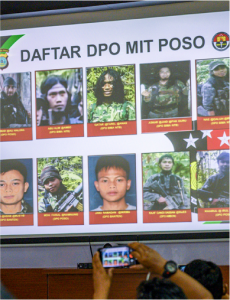
Healing and a Stronger Faith
Kila willingly stayed in police custody for a few days following the murders. “Besides questioning me about the incident,” he said, “they were also worried that MIT terrorists would hunt me down and kill me because I am a living witness. It was what MIT hates the most.”
For months after the attack, Kila suffered from crippling fear. He couldn’t eat, sleep or work, and he also developed health problems. “I no longer dared to go to my farm,” he said. “I was horrified by the memory about how those victims were massacred.”
Kila went to live with a sister while recovering from the trauma. Front-line workers provided him with food for several months, and he received further comfort and support from his local church family as well as the global body of Christ. The panic attacks and health problems he suffered after the attack have gradually decreased, and he looks forward to returning home to his father in Kalemago.
“I feel grateful to God for being able to live on,” he said. “I know God still had a plan for my life.”
Within 18 months of the attack, all of the known members of MIT were either killed or arrested and imprisoned. While Kila was satisfied that earthly justice had been served, he understood that forgiving his attackers was far more important for him.
“I have long ago forgiven them,” he said, “because in one sense they didn’t really know what to do. The eyes of their hearts were blinded by teachings that justify killing for the sake of a religion.”
Marten Solon’s family has likewise undergone a long process of healing. With Marten gone, the family has had to make many adjustments. His wife, Maria, works as a labourer on other farmers’ fields and tends another field provided by front-line workers. The field was selected because of its proximity to the village; returning to the farm where the murders occurred would be too painful.
The Solons’ youngest son, Antoni, suffered guilt and regret because he argued with his father days before the murder. He had been skipping church to spend time with friends, and his father admonished him not to forsake his faith to follow a wrong path.
“After he was gone,” Antoni said, “I realised how meaningful his wisdom was in my life. Now I realise that my life depends completely on God. My father died, but I have a Father in heaven who loves me.”
Antoni moved to South Sulawesi after the attack to live with an aunt and help take care of her strawberry fields. He now serves as a leader of worship and prayer, and he hopes to one day become a pastor. He said his experience of suffering has prepared him for a life of Christian service.
“The Lord Jesus himself was persecuted to death on the cross, so we his disciples will surely experience the same thing,” Antoni said.
When asked if fear of persecution could ever keep them from hiding their faith, Antoni’s sister Dewi said, “There has never been a doubt in our hearts about that. We will remain followers of Christ no matter what happens.
“God has already strengthened and helped us,” she continued. “We believe that God will surely help us if persecution comes again.”
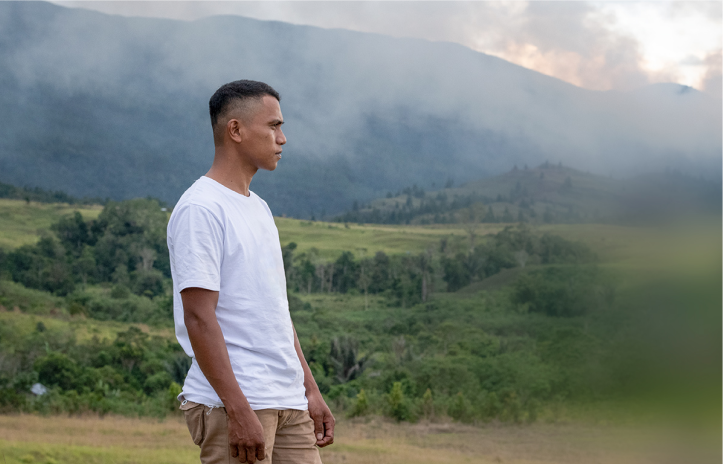
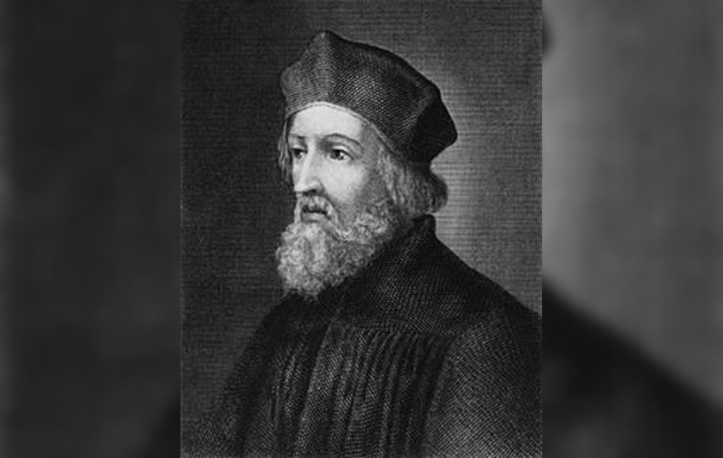
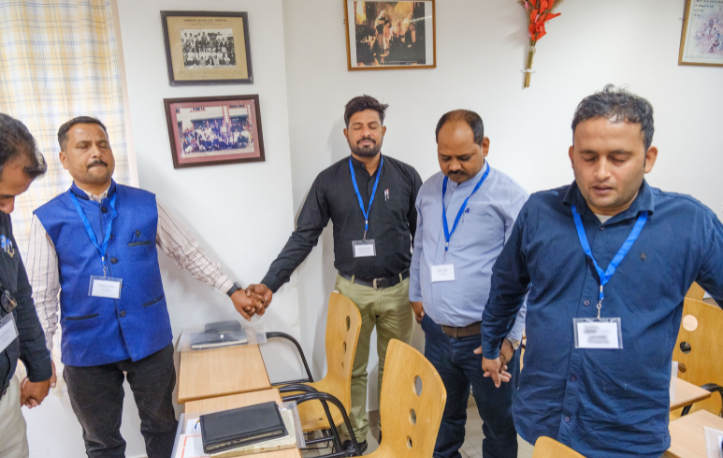
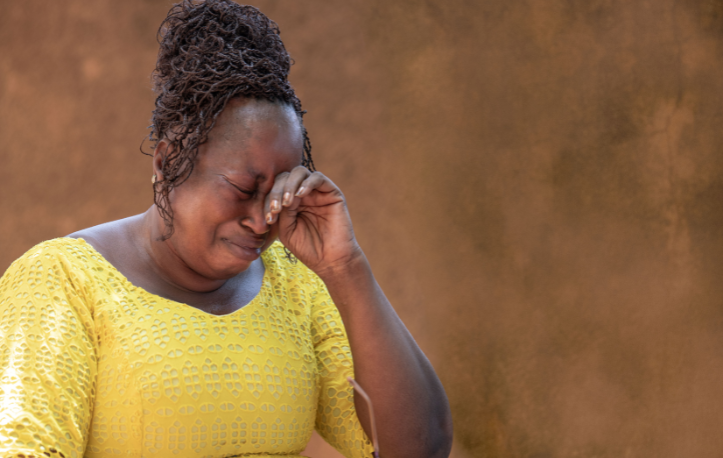
Submit a Prayer